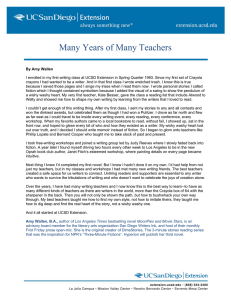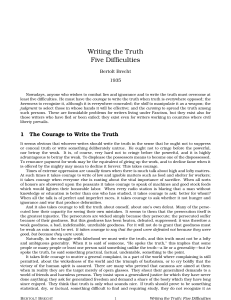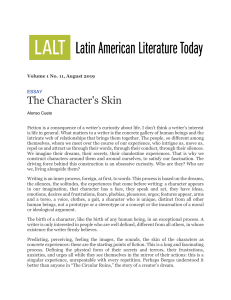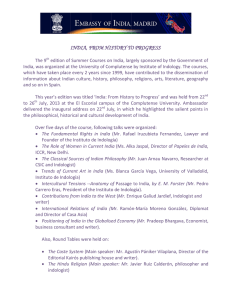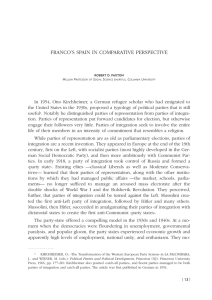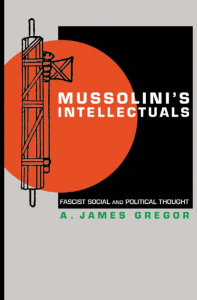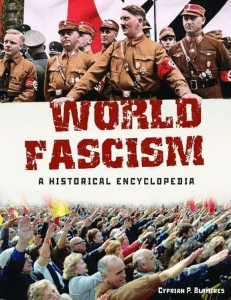Fascism Is a Lie
Anuncio
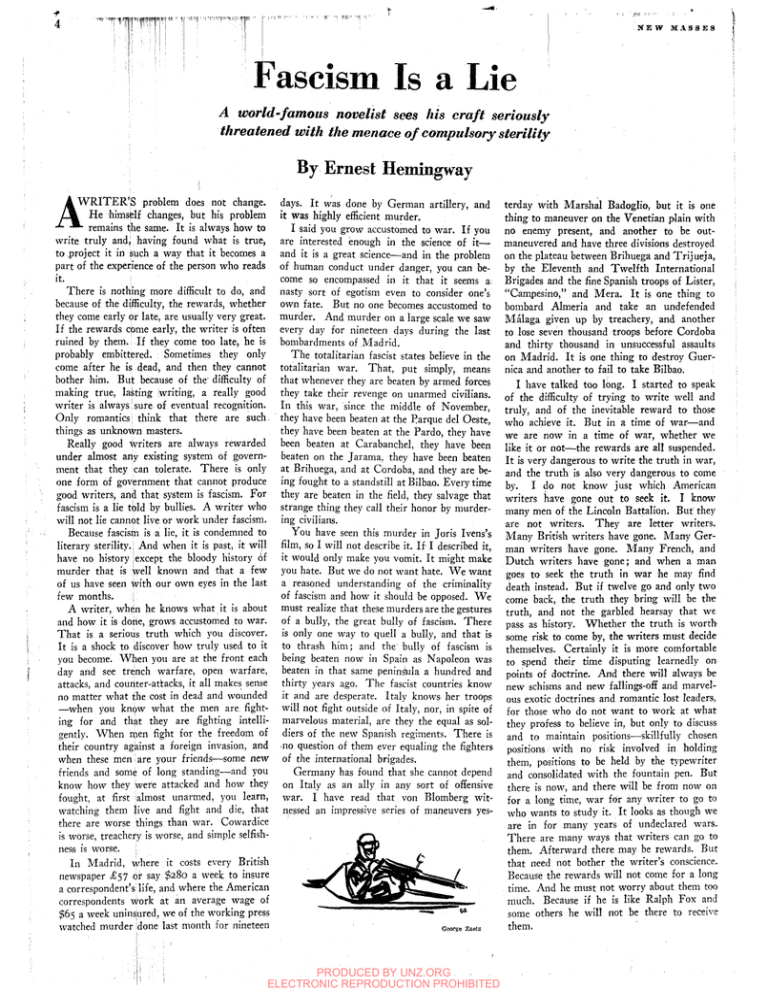
•f 4 lll[*lll|IMI[lll1[lif I T H I ' 'I nil '"IIHIP [niiiN • NEW MASSES Fascism Is a Lie A world-famous novelist sees his craft seriouslythreatened with the menace of compulsory sterility By Ernest Hemingway A W R I T E R ' S problem does not change. IjL H e himsfelf changes, but his problem -^ - ^ remains the same. It is always how to write truly and; having found what is true, to project it in such a way that it becomes a part of the experience of the person who reads it. There is nothing more difScult to do, and because of the difficulty, the rewards, whether they come early or late, are usually very great. If the rewards come early, the writer is often ruined by them. If they come too late, he is probably embittered. Sometimes they only come after he is dead, and then they cannot bother him. But because of the' difficulty of making true, lasting iwriting, a really good writer is always sure of eventual recognition. Only romantics; think that there are such things as unknown masters. Really good writers are always rewarded under almost any existing system of government that they can tolerate. There is only one form of government that cannot produce good writers, and that system is fascism. For fascism is a lie told by bullies. A writer who will not lie cannot live or work under fascism. Because fascism is a lie, it is condemned to literary sterility.: And when it is past, it will have no history ; except the bloody history of murder that is well known and that a few of us have seen with our own eyes in the last few months. i A writer, when he knows what it is about and how it is done, grows accustomed to war. T h a t is a serious truth which you discover. It is a shock to discover how truly used to it you become. W h e n you are at the front each day and see trench warfare, open warfare, attacks, and counter-attacks, it all makes sense no matter what the cost in dead and wounded —when you kniijw what the men are fighting for and that they are fighting intelligently. W h e n rnen fight for the freedom of their country against a foreign invasion, and when these men are your friends—some new friends and some of long standing—and you know how they were attacked and how they fought, at first almost unarmed, you learn, watching them live and fight and die, that there are worse things than war. Cowardice is worse, treachery is worse, and simple selfishness is worse. : In Madrid, where it costs every British newspaper £ 5 7 or say $280 a week to insure a correspondent's life, and where the American correspondents Work at an average wage of $65 a week uninsured, we of the working press watched murder done last month for nineteen days. I t was done by German artillery, and it was highly efficient murder. I said you grow accustomed to war. If you are interested enough in the science of it— and it is a great science—and in the problem of human conduct under danger, you can become so encompassed in it that it seems a; nasty sort of egotism even to consider one's own fate. But no one becomes accustomed to murder. And murder on a large scale we saw every day for nineteen days during the last bombardments of Madrid. T h e totalitarian fascist states believe in the totalitarian war. That, put sim,ply, means that whenever they are beaten by armed forces they take their revenge on unarmed civilians. In this war, since the middle of November, they have been beaten at the Parque del Oeste, they have been beaten at the Pardo, they have been beaten at Carabanchel, they have been beaten on the Jarama, they have been beaten at Brihuega, and at Cordoba, and they are being fought to a standstill at Bilbao. Every time they are beaten in the field, they salvage that strange thing they call their honor by murdering civilians. You have seen this murder in Joris Ivens's film, so I will not describe it. If I described it, it would only make you vomit. It might make you hate. But we do not want hate. W e want a reasoned understanding of the criminality of fascism and how it should be opposed. W e must realize that these murders are the gestures of a bully, the great bully of fascism. There is only one way to quell a bully, and that is to thrash him; and the bully of fascism is being beaten now in Spain as Napoleon was beaten in that same peninsula a hundred and thirty years ago. T h e fascist countries know it and are desperate. Italy knows her troops will not fight outside of Italy, nor, in spite of marvelous material, are they the equal as soldiers of the new Spanish regiments. There is no question of them ever equaling the fighters of the international brigades. Germany has found that she cannot depend on Italy as an ally in any sort of offensive war. I have read that von Blomberg witnessed an impressive series of maneuvers yes- w George Zaeta PRODUCED BY UNZ.ORG ELECTRONIC REPRODUCTION PROHIBITED terday with Marshal Badoglio, but it is one thing to maneuver on the Venetian plain with no enemy present, and another to be outmaneuvered and have three divisions destroyed on the plateau between Brihuega and Trijueja, by the Eleventh and Twelfth International Brigades and the fine Spanish troops of Lister, "Campesino," and Mera. I t is one thing to bombard Almeria and take an undefended Malaga given up by treachery, and another to lose seven thousand troops before Cordoba and thirty thousand in unsuccessful assaults on Madrid. I t is one thing to destroy Guernica and another to fail to take Bilbao. I have talked too long. I started to speak of the difficulty of trying to write well and truly, and of the inevitable reward to those who achieve it. But in a time of war—and we are now in a time of war, whether we like it or not—the rewards are all suspended. I t is very dangerous to write the truth in war, and the truth is also very dangerous to come by. I do not know just which American writers have gone out to seek it. I know many men of the Lincoln Battalion. B u t they are not writers. T h e y are letter writers. M a n y British writers have gone. Many German writers have gone. Many French, and Dutch writers have gone; and when a man goes to seek the truth in war he may find death instead. But if twelve go and only two come back, the truth they bring will be the truth, and not the garbled hearsay that we pass as history. Whether the truth is worth some risk to come by, the writers must decide themselves. Certainly it is more comfortable to spend their time disputing learnedly on points of doctrine. And there will always be new schisms and new fallings-off and marvelous exotic doctrines and romantic lost leaders, for those who do not want to work at what they profess to believe in, but only to discuss and to maintain positions^skillfully chosen positions with no risk involved in holding them, positions to be held by the typewriter and consolidated with the fountain pen. But there is now, and there will be from now on for a long time, war for any writer to go to who wants to study it. It looks as though we are in for many years of undeclared wars. There are many ways that writers can go to them. Afterward there may be rewards. But that need not bother the writer's conscience. Because the rewards will not come for a long time. And he must not worry about them too much. Because if he is like Ralph Fox and some others he will not be there to receive them. *n^ JUWE P i wmm Ffp 19S7 The War Is Ours A leading American poet discusses the two main arguments holding that the writer is above the anti-fascist battle By Archibald MacLeish T H I S meeting opens the National Congress of American Writers. Many of you here—most of you in all probability —have read the call to this congress. Briefly, that call set forth the proposition that the rise of the fascist powers and the success of fascist aggression create an issue which is of principal concern to writers in the United States. Most of you here I imagine are in agreement with that proposition. Most of you would agree that fascism with its "ministries of public enlightenment," its official press, its ventriloquist stage, is a matter of concern to men whose work demands, as the basic condition of its existence, freedom to publish. There are, however, certain writers and certain publicists who are not in agreement and who have presented their reasons for disagreement sincerely and frankly. It seems to me proper to face that disagreement at the outset of this congress, for it is only by recognizing the limits of agreement that men can usefully communicate with each other. Those who disagree with the proposition that the spread of fascism is a matter of principal concern to writers in this country advance two main arguments. T h e first is the argument that concern with the spread of fascism, and the making of common defensive front against it, amount in effect to the fomenting of war—and not only to the fomenting of war but to the fomenting of another war horribly like the last war, another war to make the world safe for democracy. T h e second is the argument that the fascist issue is in actual fact nothing but a private squabble between fascism and communism, of no concern to anyone but the partisans, and of ulterior and purely factional concern even to them. T H I S SECOND A R G U M E N T is so manifestly and demonstrably unsound that it may be left to answer itself. I t is the familiar argument advanced by the hypocrites and the cynical and the frivolous who do not wish to understand what is happening in Spain—who do not wish to accept the responsibil ty of understanding— who desire to remain ndifferent—or, worse, who desire to hide the r approval of Spanish fascism under this flimsy and ridiculous pretext. I t is the cheap and easy argument of those who wish not to think. W h a t alone gives it importance is the use its proponents make of it. They use it to attack the intelligence, if not actually the integrity, of those who, not themselves Communists, stand as the Communists stand in active opposition to the fascist attack. They imply that those who find themselves in this position are being name ever refused to make his position clear for fear that position might be of service to others than himself. T h e further truth is that the man who refuses to defend his convictions for fear he may defend them in the wrong company has no convictions. Puyol "used," and that they are dupes and stooges. This, if you stop to consider it, is a curious suggestion to come from liberal minds—for the word liberal is still a word to use with pride. One would have thought that issues, and particularly issues of freedom and truth, were more important to the liberal mind than being seen in the right company. One would have thought that, in the face of the fighting in Spain, even the most careful liberals would consider that the issue should come first and the vanity, the self-concern, afterwards. One would have thought that liberals would recognize the issue as so clearly, so inescapably their own that it would never occur to them to wonder whether in accepting it they were being used. One would have thought that they would more naturally think of themselves as the users, as the leaders in this fight, as the responsible men. There was after all a time in this country when the liberals were capable of leading, when they were not merely capable of terror lest they should be led. T h e r e was a time when they recognized their own causes and defended them without looking around to see who else defended them and for what reasons. T o my mind there is something unpleasantly squeamish and virginal about this fear of being used, this phobia of being maneuvered—something almost indecently coy. T h e danger of rape has always existed in this world, but only the tenderest spirits let it keep them in at night. T h e truth is that no writer worthy the As TO the first argument, the argument that those who make common front against fascism are themselves war-makers, indistinguishable from the war-makers of 1917, the answer seems to me even simpler. T h e answer is that it is not we who are the makers of this war. T h e answer is that the war is already made. It is made in Spain. And by the w a r I mean the war itself, the war made by fascism, the very war against which we must defend ourselves. It is the failure to understand this obvious, this all-too-obvious fact which misleads our critics. They perceive that there is fighting in Spain. They can hardly help perceiving it. But they do not perceive the nature of that fighting. They do not understand what it is. They think of it in terms of military history. They compare it with 1914. T h e y decide that, because there have been no declarations of war and because the nations of Europe have not yet mobilized their armies, the Spanish war cannot be the real war against fascism which is foreseen, but must be a sort of preliminary bout which "can be "kept from spreading to the continent of Europe." They conclude that any assistance given to the people of Spain, any support in their resistance may make it impossible to confine the war to Spain, may bring on the greater war, the real war. T h e y conclude that those who make common cause against fascism and particularly against fascism in Spain, foment this greater war. T h e weakness in this argument lies in its assumption that the pattern of 1914 fits the facts of 1937. T h e military vocabulary of 1914 and 1937 are not the same. In 1914 the methodical and murderous shelling of the civil population of a Spanish sea-coast town by a German fleet would have been an act of war. In 1937 it is not an act of war. T h e Spaniards merely die, and the Germans sail away. I n 1914 the massacre of the civil population of an undefended Basque village by German planes would have been an act of war. In 1937 it is not an act of war. T h e Basques merely lie kicking in the fields where the machine guns caught up with them, and the Germans fly away. T h e wars of 1937 are not fought by declarations and mobilizations. They are fought in the back streets like the assassinations of gunmen. And for an excel- PRODUCED BY UNZ.ORG ELECTRONIC REPRODUCTION PROHIBITED

